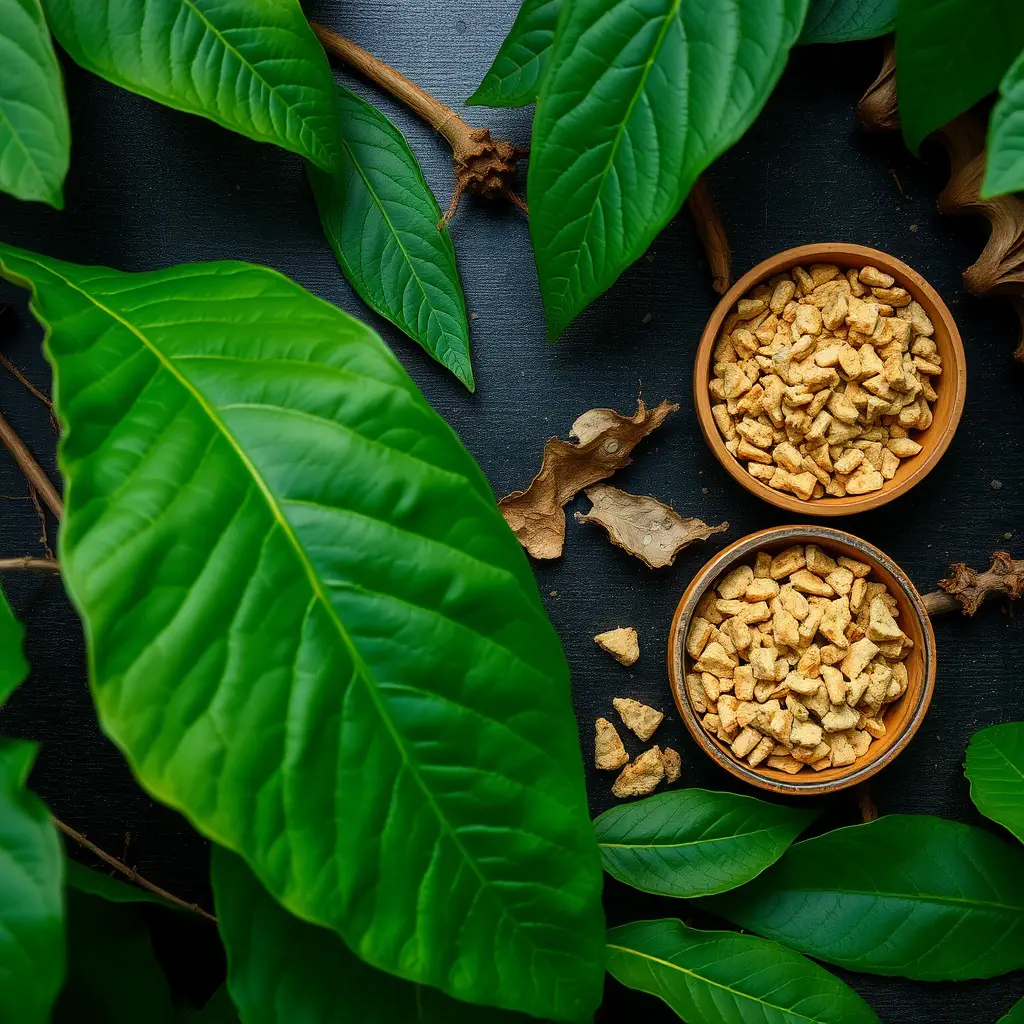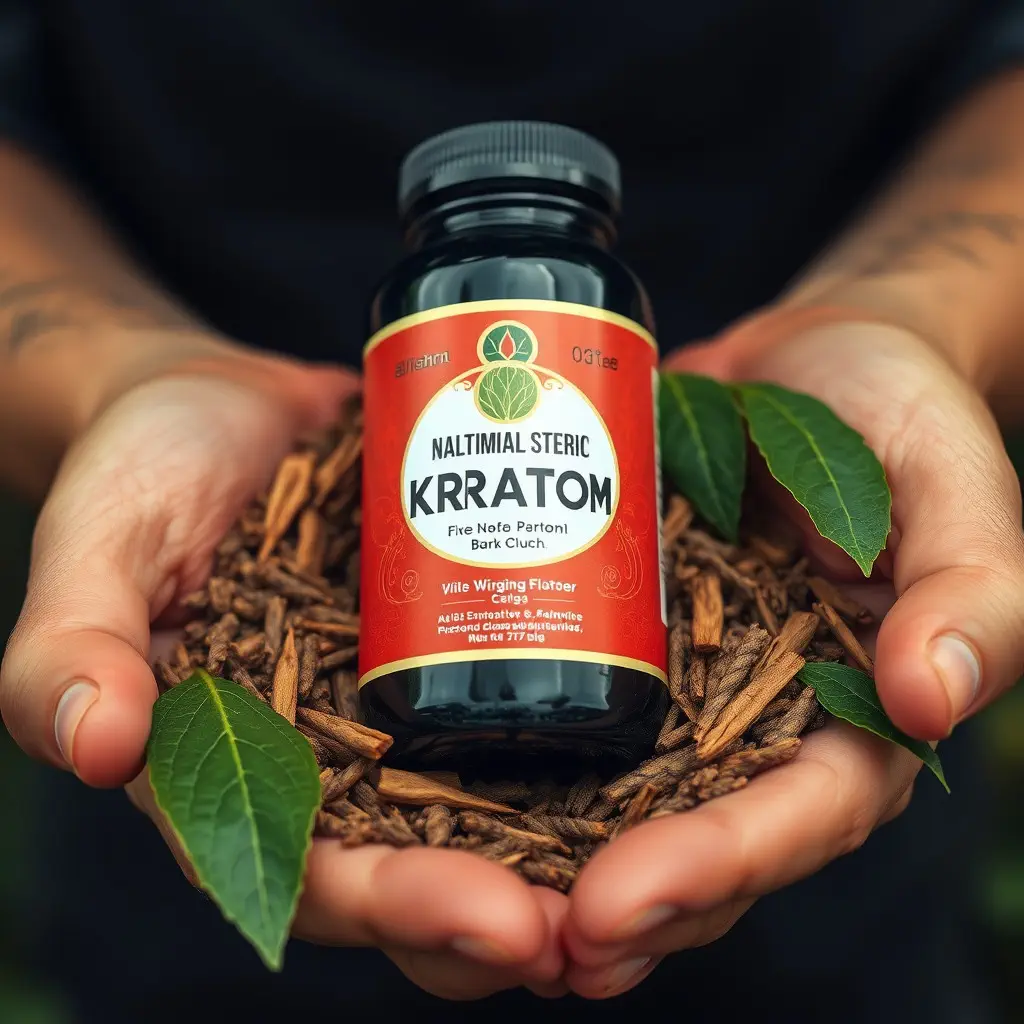Kratom, derived from Southeast Asia, is emerging as a natural alternative for managing stress and anxiety, with its primary active compounds, mitragynine and 7-hydroxymitragynine, offering potential health benefits by interacting with brain receptors. Its calming effects can promote well-being and help alleviate symptoms associated with stress and anxiety. It's crucial to use kratom responsibly, considering the varying effects on individuals, and to determine the right dosage and strain—like Bali or Indo for relaxation and Maeng Da for energy without drowsiness—that suits one's needs. Due to individual differences in response, personal experimentation with reliable sources is necessary to find an optimal experience for stress relief. Consulting healthcare professionals is recommended before integrating kratom into a wellness regimen to ensure it complements other health strategies and to avoid potential interactions. Kratom fits within the landscape of natural remedies, offering benefits that can be harnessed effectively with careful consideration and professional guidance.
Exploring the therapeutic potential of kratom as a natural remedy for stress and anxiety, this article delves into its calming properties and how it can be harnessed for serene well-being. We’ll guide you through understanding kratom’s role in managing these common yet debilitating conditions. From the benefits of its unique alkaloids to safe usage practices, including optimal dosages and preferred strains, learn everything you need to know about integrating kratom into your stress and anxiety management routine. Discover the path to tranquility with kratom’s natural remedies.
- Unlocking the Calming Properties of Kratom for Stress Relief: A Guide to Its Benefits
- Understanding Kratom's Role as a Natural Anxiety Reliever: How It Can Help You Find Serenity
- Safe Kratom Use for Anxiety and Stress Management: Dosage, Strains, and Precautions
Unlocking the Calming Properties of Kratom for Stress Relief: A Guide to Its Benefits
Kratom, a plant native to Southeast Asia, has garnered attention in recent years as a natural remedy for managing stress and anxiety. Its leaves contain alkaloids that can interact with the brain’s receptors, potentially offering a range of benefits. Among these, the calming properties of kratom stand out as particularly beneficial for individuals seeking relief from the pressures of daily life. When ingested, kratom can promote a sense of well-being and tranquility, helping to alleviate symptoms associated with stress and anxiety. The alkaloid mitragynine, one of the primary active components in kratom, is thought to contribute to these effects by influencing neurotransmitters like serotonin and dopamine, which are pivotal in regulating mood.
For those considering kratom as a natural alternative to conventional stress-relief methods, it’s crucial to approach its use with informed guidance. Proper dosage and strain selection are key factors that can influence the experience and outcomes. Strains like Bali or Indo are commonly favored for their soothing effects, whereas strains such as Maeng Da are known for their invigorating qualities. It’s important to understand that individual responses to kratom can vary significantly, making personal experimentation with reputable sources a necessary step in determining the most effective kratom benefits for stress relief. As with any natural remedy, it’s advisable to consult with healthcare professionals before integrating kratom into one’s wellness routine to ensure safety and efficacy.
Understanding Kratom's Role as a Natural Anxiety Reliever: How It Can Help You Find Serenity
Kratom, a tropical tree native to Southeast Asia, has garnered attention in recent years for its potential as a natural remedy for managing stress and anxiety. The benefits of kratom are rooted in its active alkaloids, mitragynine and 7-hydroxymitragynine, which interact with the brain’s receptors, influencing mood and emotion regulation. For individuals seeking an alternative to pharmaceutical treatments, kratom offers a holistic approach to finding serenity. The plant’s ability to modulate neurotransmitters such as dopamine and serotonin can provide a sense of calm and well-being, helping to alleviate the symptoms of anxiety. It’s important to approach kratom with caution, as its effects can vary widely among users, and appropriate dosing is key to achieving the desired therapeutic effect without unwanted side effects. Additionally, integrating kratom into a broader strategy that includes healthy lifestyle choices, such as regular exercise, a balanced diet, and adequate sleep, can further enhance its benefits as a natural remedy for reducing stress and anxiety. Users considering kratom as part of their wellness regimen should consult with healthcare professionals to ensure it aligns with their overall health goals and to navigate any potential interactions with other medications.
Safe Kratom Use for Anxiety and Stress Management: Dosage, Strains, and Precautions

Kratom, a plant native to Southeast Asia, has garnered attention as a natural remedy for managing stress and anxiety. Its benefits are attributed to its alkaloid composition, particularly mitragynine and 7-hydroxymitragynine, which can interact with the brain’s receptors in ways that may influence mood and pain perception. For individuals seeking alternatives to prescription medications for anxiety and stress management, kratom offers a potential pathway to wellness.
When considering safe kratom use for anxiety and stress, dosage and strain selection play pivotal roles. Generally, lower doses are recommended as a starting point, as they can provide a calming effect without the sedative properties of higher doses. Strains like Bali or Indo are often preferred for their purported anxiolytic properties. Maeng Da is another strain that users report to be effective in alleviating stress and promoting a sense of relaxation without drowsiness. It’s crucial to approach kratom use with caution, as individual responses can vary significantly. Users should also be aware of the legal status of kratom in their jurisdiction, adhere to recommended dosages, and avoid combining it with other substances or medications. Consulting with a healthcare provider before integrating kratom into one’s wellness routine is essential for personalized guidance and to ensure that this natural remedy aligns with one’s overall health goals. Precautions such as regular monitoring of one’s mental state, adherence to quality control measures for product sourcing, and staying informed about the latest research on kratom are also key components of safe usage. By carefully considering these aspects, individuals can harness the potential kratom benefits for managing anxiety and stress in a manner that supports their holistic health journey.
Kratom has emerged as a promising natural remedy for those seeking to alleviate stress and anxiety. This article has illuminated the calming properties of kratom, delineating its benefits for stress relief and its role as a natural anchor against anxiety. With careful consideration of safe use practices, including appropriate dosage and strain selection, individuals can harness kratom’s potential to promote tranquility. As interest in holistic health approaches continues to grow, the insights provided here underscore the importance of responsible exploration of kratom’s role in wellness regimens. By integrating kratom benefits thoughtfully and judiciously, individuals can explore a more serene state of mind.






